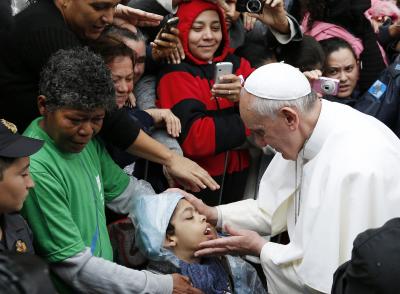 Jesus’ life, death and resurrection could be summarized as a resounding “YES” in answer to this question!
Jesus’ life, death and resurrection could be summarized as a resounding “YES” in answer to this question!
Jesus’ encapsulates His teaching as “Love the Lord your God with all your heart, soul, mind and strength” and “Love your neighbor as yourself” (Mark 12:30-31, Matt. 22:37, Luke 10:27). The first instruction, concerning our relationship with God, comes from Deuteronomy 6:5. The second, concerning our relationship to each other, is from Leviticus 19:18.
In the Church, this balanced relationship between God and our neighbor is often explained with reference to the crucifix. The vertical piece of wood represents our relationship with God and the horizontal is our relationship with our neighbor or “brother”. Helpfully, just in case anyone chooses to be selective as to who “my neighbor” or “my brother” actually is, then, Jesus tells us the Parable of the Good Samaritan (Luke 10:25-37).
So what would Jesus think of Pope Francis’ question, “How can it be that it is not a news item when an elderly homeless person dies of exposure, but it is news when the stock market loses two points?” I find it interesting that this appears in a paragraph (53) discussing the commandment “Thou shalt not kill”.
In the section entitled “No to an economy of exclusion,” the Pope also calls into question the “trickle-down theories” advocated by those who support “The Market” and “Laissez Faire” economics espoused by thinkers like Adam Smith and Ayn Rand. Those whose consciouses make them uncomfortable often cite: “The poor will always be with you” (Mark 14:7). However, it is enlightening to note that Jesus is echoing Deuteronomy 15:11: “There will always be poor people in the land. Therefore, I command you to be open-handed towards your fellow Isrealites who are poor and needy in your land.” Indeed, the Laws given by God to the People continuously make special provision for the poor along with the “widows and orphans.”
For many in the Church, our faith life is about our relationship with God in heaven and saving our souls. We also pray for the souls of our loved ones. However, we are often uncomfortable with those others in the Church who feed the hungry, visit those in prison, clothe the naked and serve the sick. This kind of activity may be acknowledged as “corporeal works of mercy” but is often also labelled – in a disparaging way – as mere “social work” and is seen as taking attention away from piety.
In Romans, St. Paul talks about being justified or saved by faith, but how do we know that we actually have faith? That one isn’t deluded or deluding one’s self? Jesus said that “by their fruit you will know them” (Matt. 7:16-20) and, in the Parable of the Sower, Jesus praises “hearing the word, receiving it, and bringing forth fruit” (Mark 4:20). This seems to suggest that, as far as Jesus is concerned, belief results in “fruit” and that faith will yield good fruit.
The book of James builds on this by asking the very practical question: “Suppose a brother or sister is without clothes and daily food. If one of you says to them, ‘Go in peace; keep warm and well fed,’ but does nothing about their physical needs, what good is it?” Hence, the author concludes that “Faith by itself, if it not accompanied by action, is dead.” He also says “Show me your faith without deeds, and I will show you my faith by my deeds. You believe that there is one God. Good! Even the demons believe that – and shudder.”
In all this I am guided by what Jesus says about judging between the sheep and goats (Matt. 25:31-46). Those whom He says are blessed by His Father and receive the kingdom are those who fed Jesus when He was hungry, invited Him in when they saw Him as a stranger, clothed Him when they saw Him naked, cared for Him when they saw Him sick, and visited Him in prison. For as Jesus says, “whatever you did for one of the least of these brothers and sisters of mine, you did for Me.”
In conclusion, the Pope named himself as ‘Francis’ recalling one of the most beloved and acknowledged ‘good’ people who ever lived. For many of us, St. Francis is the closest example of what Jesus would have been like. In the early 13th century St. Francis was part of a non-materialism reform movement sweeping through Europe. His followers were to focus on poverty, simplicity, chastity and obedience and he emphasised the humanity of Jesus. St. Francis, known for his joyfulness, recalled for many the joyful early Christian communities we know from the Acts of the Apostles where all shared what they had in common and no one was in need. Their interdependence, on each other and therefore on God, resulted in joyfulness.
In his critique of our acceptance of poverty and injustice, Pope Francis is saying to us: Perhaps the “something” which we are all searching for in life is the realization that we are our brother’s keeper and accepting that truth is the joy of the gospel.
 This Week: Sunday, March 30
This Week: Sunday, March 30 
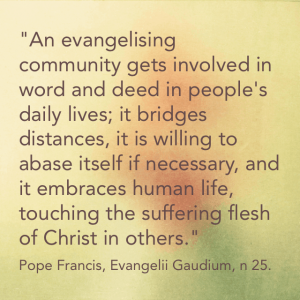
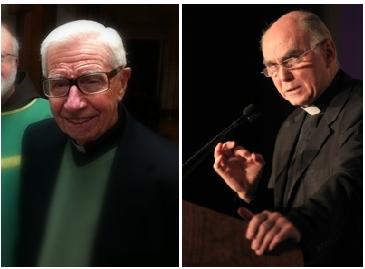
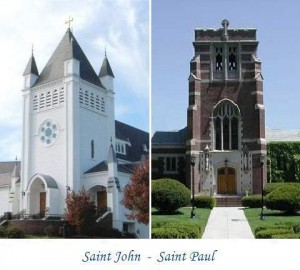

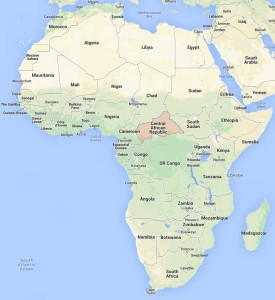
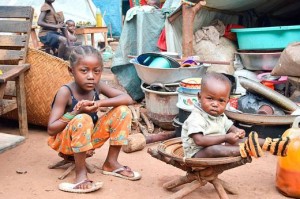

 Registration closes this Sunday, March 23 for the St. John’s Easter Youth Choir. Children in grades 1-8 are invited to participate in this choir that will sing at the 9:00 AM Family Mass on Easter Sunday, April 20, 2014. High School Assistants are welcome. There are 5 rehearsals: March 16, March 23, March 30, April 4, and April 13. All rehearsals are from 10:50-11:50am in the Chapel.
Registration closes this Sunday, March 23 for the St. John’s Easter Youth Choir. Children in grades 1-8 are invited to participate in this choir that will sing at the 9:00 AM Family Mass on Easter Sunday, April 20, 2014. High School Assistants are welcome. There are 5 rehearsals: March 16, March 23, March 30, April 4, and April 13. All rehearsals are from 10:50-11:50am in the Chapel.






